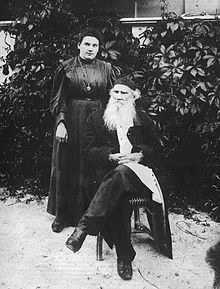Alexandra Tolstaya
Appearance

Countess Alexandra Lvovna Tolstaya (18 June 1884 – 26 September 1979) was the youngest daughter and secretary of Leo Tolstoy.
Quotes
[edit]Tolstoy: A Life of My Father
[edit]- Trans. Elizabeth Reynolds Hapgood, London: Victor Gollancz Limited, 1953.
- There was one characteristic which Tolstoy kept until late in life—a childlike, spontaneous gaiety, an unaffected, almost passionate enthusiasm for sports, games, all sorts of pastimes. “A game is a serious matter”—this was a saying of Tatiana A. Behrs-Kuzminskaya which Tolstoy loved to repeat. When he was playing, wrestling, hunting, chasing his children, he did it in earnest, he threw himself into it with all his being and enjoyed it as much as his children. The Yasnaya Polyana school children were infected with his gaiety.
- Ch. 24, p. 141
- Seryozha was different from all the other Tolstoys because of his great shyness and reserve. He often concealed his emotions, his outbursts of tenderness or passion, under a cloak of deliberate rudeness, or brusqueness. The most serious-minded and industrious of all the Tolstoy brothers, he had his own separate existence; he did not lean toward either his mother, or his father, and he rarely confided his thoughts to the members of his family. It was only when he sat down to the piano and for hours played his beloved Chopin, Beethoven, Bach, Grieg, or attempted to compose something himself, that everyone listened to him.
- Ch. 43, p. 300
- Tanya strove to reconcile her parents. She was very fond of her mother, but she sympathized with her father's views and she pleaded with her mother to make some concessions. Sergei tried to get away from it all. Ilya was absorbed in his own material cares and family. Lev was inclined to his mother's side. Masha was on bad terms with her mother; wholeheartedly devoted to her father, she suffered more than anyone else on his account.
- Ch. 44, p. 311
- From time to time he [Tolstoy] posed—a tiring obligation—for painters and sculptors: for Repin, Pasternak who did a study of the family, Aronson, and Paolo Trubetskoy. Trubetskoy, a Russian educated in Italy, did some splendid little statues of Tolstoy—one of him on horseback. Father was very fond of him. A sweet and childlike person in addition to his great gifts, he read practically nothing, spoke little, all his life was wrapped up in sculpture. As a convinced vegetarian he would not eat meat but cried: “Je ne mange pas de cadavre!” if anyone offered him some. In his studio in St. Petersburg there was a whole zoo: a bear, a fox, a horse, and a vegetarian wolf.
- Ch. 57, p. 413
- Masha died quietly, conscious to the last. Father and Kolya were sitting by her bed. They raised her on her pillow. An hour before she died she opened her eyes wide, saw Father and laid his hand on her breast. Father leaned over her and raised her thin, transparent hand to his lips. “I am dying,” she whispered almost inaudibly.
- Ch. 61, p. 452
- How difficult it is to recognize spiritual illness in a person close to you, especially if the habit of years has established that person's power and authority. Had I realized that my mother was ill, my whole attitude toward her would have been different. But people far more experienced than I were equally blind. With every day Mother grew more nervous. Everything irritated her, made her weep, have hysterics, outbursts of temper.
- Ch. 65, p. 476
Quotes about Alexandra Tolstaya
[edit]- The youngest daughter, Alexandra, was getting older. Dedicating herself completely to her father, she was an effective moral support and helper in his writing labors. She even learned stenography.
- Victor Lebrun, Leo Tolstoy, trans. Victor P. Epp (Lulu.com, 2005), p. 130.

